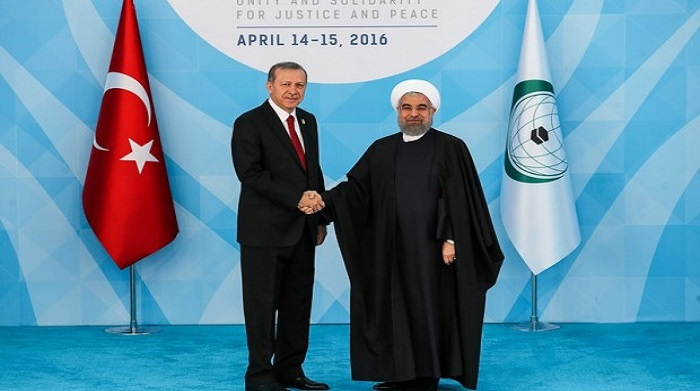Saudi-Backed OIC Statement Fails To Outmaneuver Iran

The Organization of Islamic Cooperation (OIC) has issued a final communique following a two-day leaders summit just closed in Istanbul, condemning Iran’s “aggression” against the missions of Saudi Arabia in Tehran and Mashhad, as a “flagrant violation of the Vienna Convention on Diplomatic Relations, the Vienna Convention on Consular Relations and international law”. The statement also dismissed Iran’s statements on Saudi Arabia’s execution of prominent Shiite cleric Sheikh Nimr al-Nimr, as “a blatant interference in the internal affairs of Saudi Arabia and a contravention of the United Nations charter, the OIC charter and of all international covenants”, according to Qatari newspaper Gulf Times. The statement, blatant and flagrant itself, also deplored Iran’s so-called interference in the internal affairs of the states of the region and other member states, including Bahrain, Yemen, Syria, and Somalia, and its continued support for terrorism.
The draft declaration has reportedly been prepared during an expert-level meeting of the organization in the Saudi port city of Jeddah in February after the Saudi embassy in Tehran was attacked by ‘spontaneous’ protesters. The Iranian officials could not attend that meeting as they were denied visas by Riyadh.
Iranian officials have slammed the inclusion of anti-Iran articles in the final communique, noting the domination of certain member states on the OIC and its failure to avoid bias in its decision-making processes. “The general atmosphere governing the OIC under the current circumstances is not really indicative of cooperation among Muslim countries and unity in the Muslim world,” Iranian Deputy Foreign Minister Abbas Araqchi said on the sidelines of the organization’s 13th summit in Istanbul, on Thursday. “Unfortunately, the organization has invariably suffered from this structural and organizational weakness,” PressTV quoted the Iranian official as saying.
Iranian President Hassan Rouhani also slammed "any divisive move" as unacceptable in his address to the summit. “No message which would fuel division in the Islamic Ummah should come out of the conference of the Organization of Islamic Cooperation," Rouhani said. He added that “any divisive move is invalid,” as it does not enjoy the consensus of the member states and Muslim community and as it is against the objectives of the organization.
Elsewhere in his remarks, the Iranian President touched on challenges facing Muslims and voiced Tehran’s support for the Muslim countries grappling with terror threats. Iran “has always backed and will back Muslim countries in the face of aggression, threats, occupation and terrorism,” he said. The Islamic Republic will not hesitate to help oppressed Muslims if they demand such assistance in the fight against the terrorists and aggressors seeking to pose threats to sacred Muslim sites, Rouhani noted.
He added that extremist and Takfiri groups are killing people in cold blood, expressing regret that their bestial crimes are perpetrated in the name of Islam, which has been the main victim of such atrocities. He also warned about threats posed by the Israeli regime, saying Tel Aviv is the “main source of extremism and violence” in the region, criticizing the international community for remaining silent on the regime’s crimes.
On Wednesday, Iranian Foreign Minister Mohammad Javad Zarif also slammed Saudi Arabia’s move to include statements against Tehran and Hezbollah as “destructive.” He warned that attempts by the Saudis to use the OIC mechanism to achieve their political goals resemble efforts by the former regime of Iraq’s Saddam Hussein against Iran during the organization’s meeting at the time of Iraq’s imposed war against Iran in the 1980s.
Following Iran’s strong condemnation of the statement, Rouhani and Zarif declined to attend the summit’s closing ceremony to show their disapproval. The move has been interpreted in Iran as a decisive gesture that countered the Saudi-backed scenario. Turkey, that has just taken over as the new rotating OIC president, decided not to read the final statement during the closing ceremony of the summit, in what is being called as “differences among the member states”.
The standoffish relations between the two Islamic powers has turned into a full-fledged diplomatic war with repercussions in trade, oil prices, sports, and pilgrimages. While Tehran’s conciliatory foreign policy seems to have seen little change after the nuclear deal, the Saudis have not refrained from their war-mongering efforts and support for terrorist groups so much so that they are making an alliance with the Zionist regime against all odds. The kingdom’s groundless fear of a re-empowered Iran has put the former in an ardent need for reassurances from world powers, which it has received in abundance in recent months but seems to want more. Instead of further complicating its ties with Iran, the kingdom should seriously consider mending them before Iran’s imminent comeback as a trusted regional player.

